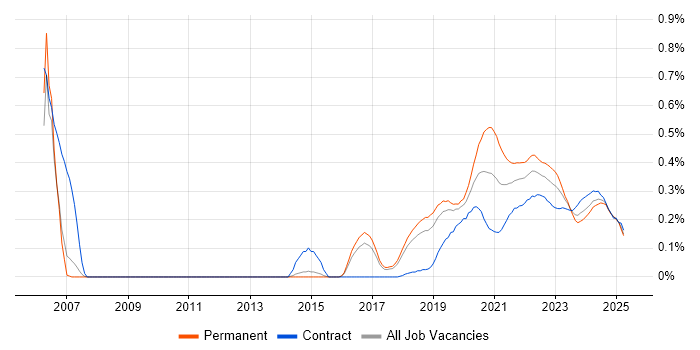Site Engineer
UK > Work from Home
The median Site Engineer salary for remote or hybrid work is £70,000 per year, according to job vacancies posted during the 6 months leading to 6 May 2025.
The table below provides salary benchmarking and summary statistics, comparing them to the same period in the previous two years.
|
|
6 months to
6 May 2025 |
Same period 2024 |
Same period 2023 |
| Rank |
399 |
522 |
514 |
| Rank change year-on-year |
+123 |
-8 |
+14 |
| Permanent jobs requiring a Site Engineer |
31 |
63 |
145 |
| As % of all permanent jobs with a WFH option |
0.20% |
0.19% |
0.34% |
| As % of the Job Titles category |
0.22% |
0.19% |
0.36% |
| Number of salaries quoted |
30 |
61 |
136 |
| 10th Percentile |
£62,017 |
£55,000 |
£42,874 |
| 25th Percentile |
£64,509 |
£80,000 |
£57,500 |
| Median annual salary (50th Percentile) |
£70,000 |
£90,000 |
£75,781 |
| Median % change year-on-year |
-22.22% |
+18.76% |
-5.27% |
| 75th Percentile |
£80,000 |
£118,750 |
£93,125 |
| 90th Percentile |
£91,000 |
£143,750 |
£100,000 |
| UK median annual salary |
£69,384 |
£87,500 |
£75,391 |
| % change year-on-year |
-20.70% |
+16.06% |
-5.76% |
For comparison with the information above, the following table provides summary statistics for all permanent IT job vacancies with WFH or hybrid options. Most job vacancies include a discernible job title that can be normalized. As such, the figures in the second row provide an indication of the number of permanent jobs in our overall sample.
| Permanent vacancies in Work from Home with a recognized job title |
14,296 |
32,437 |
40,695 |
| % of permanent jobs with a recognized job title |
91.01% |
96.00% |
96.02% |
| Number of salaries quoted |
9,941 |
24,889 |
28,911 |
| 10th Percentile |
£30,000 |
£33,000 |
£36,626 |
| 25th Percentile |
£43,750 |
£42,500 |
£47,411 |
| Median annual salary (50th Percentile) |
£60,000 |
£56,000 |
£62,500 |
| Median % change year-on-year |
+7.14% |
-10.40% |
+4.17% |
| 75th Percentile |
£77,500 |
£75,000 |
£81,250 |
| 90th Percentile |
£100,000 |
£92,500 |
£100,000 |
| UK median annual salary |
£57,500 |
£52,500 |
£60,000 |
| % change year-on-year |
+9.52% |
-12.50% |
- |

